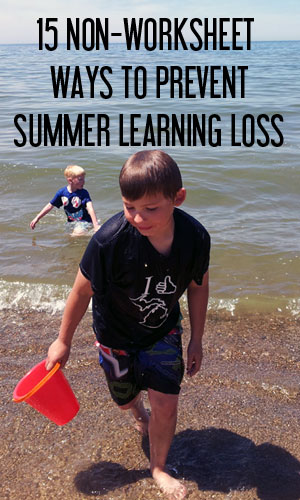15 Non-worksheet Ways to Prevent Summer Learning Loss
 School is officially out for summer here in northern Michigan. Myself, along with many parents worry that some of the academic progress our children made over the school year will be undone by summer learning loss. At the same time I don’t want to spend the summer sitting at the kitchen table with the kids doing worksheets when we could be outside soaking up the sun. Summer doesn’t last very long in Michigan, and I want our family to enjoy it. So I went in search of creative ways to keep our children’s minds from turning to mush and keep the fun in summer.
School is officially out for summer here in northern Michigan. Myself, along with many parents worry that some of the academic progress our children made over the school year will be undone by summer learning loss. At the same time I don’t want to spend the summer sitting at the kitchen table with the kids doing worksheets when we could be outside soaking up the sun. Summer doesn’t last very long in Michigan, and I want our family to enjoy it. So I went in search of creative ways to keep our children’s minds from turning to mush and keep the fun in summer.
1. Take advantage of your local library. In the summer libraries offer all sorts of kid-friendly activities from reading clubs, to story time, to Lego club. The library in our town even has a kids’ guitar club that meets weekly.
2. Add a few stops at museums and historical sites to your summer travel itinerary. The summer after my son studied Michigan history in school, we toured Fort Mackinac and Fort Michilimackinac. He was so excited to see the places he studied and hear re-enactors bring the stories to life. I was surprised how much he remembered from class and how interested he was in all of it. The trip really reinforced what he learned that year.
3. Listen to audio books. It’s important that kids read over the summer, but listening to audio books gives them a break once in a while. It may sound like cheating, but it has a lot of advantages, like improving listening skills, learning new vocabulary words and teaching how to read out loud expressively. When you’re driving in the car turn off the radio and put on an audio book.
4. Explore the outdoors. Take a hike and see how many wildflowers you can identify. Go to the beach and look for interesting shells or rocks to identify. You can find semi-precious gemstones on the shores of Lake Superior and Petoskey stones on northern Lake Michigan beaches.
5. Do science experiments at home. Try simple ones like the Mentos in the Coke bottle trick or microwave a bar of Ivory soap and see what happens. You can many more like these with a simple internet search.
6. Send them outside to play. Free play grows kids imaginations and develops strong, healthy bodies that grow strong, healthy minds.
7. Have an Arts and Crafts time. Summer is the perfect time for messy crafts like finger painting, because you can have them do it outside. Then you don’t have to worry about spills and splatters. Sidewalk chalk is another way to incorporate art into your outdoor time.
8. Enroll kids in community education classes, day camps and church programs for learning opportunities that also provide social opportunities with peers. I’ve seen all sorts of classes offered in our town including soccer camp, art camp and theater camp.
9. Go out and look at the stars. It’s finally warm enough to stay outside after dark, so take advantage of it. Have an astronomy lesson with your kids. Headlands International Dark Sky Park in Emmet County, Michigan is one of only six in the country. Lack of artificial light makes for maximum viewing of the night sky at this unique park.
10. Go outside and observe and identify insects. It’s not hard to find an ant hill to watch or you can catch fireflies at night. Look for bees busy at work in the flowers. Maybe you’ll find a praying mantis or walking stick.
11. Take a trip to the zoo. Kids love animals and they won’t even know they’re on an educational trip. There are several zoos in Michigan.
12. Garden with your kids. You can plant a veggie garden or grow flowers. If you can’t do it at your home, seek out a community garden to participate in. Learning how plants develop and where food comes from is a valuable lesson for anyone.
13. Put a bird feeder up in your yard where you can view it from a window. Purchase a bird identification book or find a guide online. Then watch and see what colorful birds come to eat at your house.
14. Go on a tree scavenger hunt. Take a hike in the woods and see how many different kinds of trees you can identify. This is a great way to learn what is native to your area.
15. Play in the water. Water play will cool everyone off, and you can teach lessons like displacement, mass and volume.



